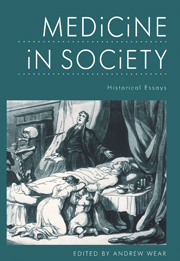Book contents
- Frontmatter
- Contents
- List of contributors
- Introduction
- Healers in the medical market place towards a social history of Graeco-Roman medicine
- Medicine and society in medieval Europe, 500-1500
- The patient in England, c. 1660–c. 1800
- Making sense of health and the environment in early modern England
- Medicine in the age of Enlightenment
- The rise of the modern hospital in Britain
- Medical practitioners 1750–1850 and the period of medical reform in Britain
- Public health, preventive medicine and professionalization: England and America in the nineteenth century
- Madness and its institutions
- From infectious to chronic diseases: changing patterns of sickness in the nineteenth and twentieth centuries
- Providers, ‘consumers’, the state and the delivery of health-care services in twentieth-century Britain
- The implications of increased life expectancy for family and social life
- Index
The patient in England, c. 1660–c. 1800
Published online by Cambridge University Press: 13 January 2010
- Frontmatter
- Contents
- List of contributors
- Introduction
- Healers in the medical market place towards a social history of Graeco-Roman medicine
- Medicine and society in medieval Europe, 500-1500
- The patient in England, c. 1660–c. 1800
- Making sense of health and the environment in early modern England
- Medicine in the age of Enlightenment
- The rise of the modern hospital in Britain
- Medical practitioners 1750–1850 and the period of medical reform in Britain
- Public health, preventive medicine and professionalization: England and America in the nineteenth century
- Madness and its institutions
- From infectious to chronic diseases: changing patterns of sickness in the nineteenth and twentieth centuries
- Providers, ‘consumers’, the state and the delivery of health-care services in twentieth-century Britain
- The implications of increased life expectancy for family and social life
- Index
Summary
If the development of medicine is to be seen to have any progressive unity which relates its past to its present and future, the focus of that study must lie with the evolution of the medical profession, the development of clinical techniques, the rise of scientific medicine and the institutions within which it is pursued and practised. All of this – the stuff of regular medical history – presupposes, silently, the existence of the very raison d' étre of medicine, the sick person. The history of the sick cannot be written in the same sequential way in which one tells the chronicle of medicine and doctors, of Falloppio being the teacher of Fabricius, who in his turn was the teacher of William Harvey, who discovered the circulation of the blood, and ‘founded ’ modern scientific medicine. But that does not mean that it cannot, or should not, be written at all. Nor does it imply that medical patients are in some sense ‘ subhistorical ’, timeless objects merely waiting to be treated by doctors who are part of progress.
For the sick too have had their own medical culture, one with profound links to the wider consciousness of their times – religious, political, moral, aesthetic. Moreover, in important ways, the sick have not just been ‘ patients ’ but ‘agents ’ as well, both looking after their own health, and playing active roles in managing their dealings with medical professionals and the institutions of regular medicine.
- Type
- Chapter
- Information
- Medicine in SocietyHistorical Essays, pp. 91 - 118Publisher: Cambridge University PressPrint publication year: 1992
- 9
- Cited by



